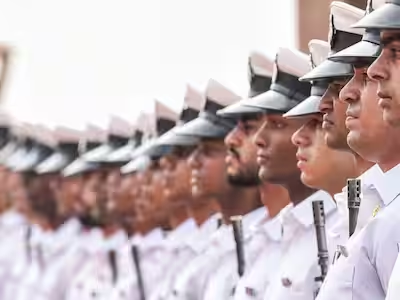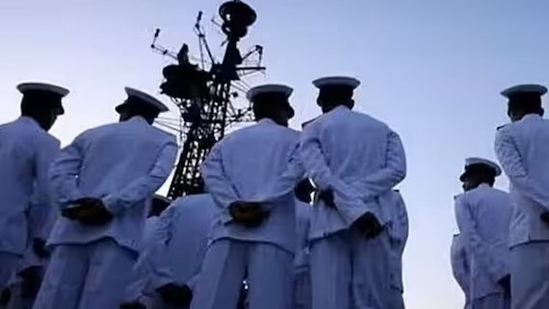In a significant diplomatic achievement, eight former Indian Navy personnel detained in Qatar on espionage charges have been released, with seven already back on Indian soil. This development follows intense negotiations and high-level interventions by the Indian government, underscoring the nation’s commitment to protecting its citizens abroad. However, amid the relief and celebrations, the veterans are urging the Indian government to secure the return of a colleague left behind in Qatar.
Background of the Detention

The eight veterans—Captain Navtej Singh Gill, Captain Saurabh Vasisht, Commander Purnendu Tiwari, Captain Birendra Kumar Verma, Commander Sugunakar Pakala, Commander Sanjeev Gupta, Commander Amit Nagpal, and Sailor Ragesh—were employed by Dahra Global Technologies and Consultancy Services, a private defense services provider in Qatar. Their roles involved training, logistics, and maintenance services for the Qatari Emiri Naval Force (QENF).
In August 2022, they were arrested by Qatari authorities on undisclosed charges, leading to a prolonged period of uncertainty and concern among their families and the Indian community. The arrest was sudden, with little information provided about the reasons behind the detention. Speculations ranged from alleged security breaches to espionage, but no formal charges were made public for several months.
The families of the detained veterans, based in India, launched a series of appeals to the Indian government, seeking its intervention. They organized protests, reached out to media outlets, and used social media to draw attention to the plight of their loved ones. The uncertainty surrounding the case, coupled with limited consular access, heightened the anguish of the families.
The Legal Proceedings
Following their arrest, the veterans were held in solitary confinement, with limited information available about the charges against them. Despite multiple bail pleas, they remained in custody, facing a legal process marked by secrecy and limited transparency. The Qatari legal system, with its stringent security laws, posed significant challenges to securing timely legal assistance for the detained personnel.
On October 26, 2023, a Qatari court sentenced all eight men to death, a verdict that shocked India and prompted immediate diplomatic efforts to secure their release. The death sentence, perceived as unusually harsh, raised serious concerns about the nature of the charges and the fairness of the trial. Legal experts in India criticized the opacity of the proceedings and called for an independent review of the case.
Appeals were promptly filed, challenging the verdict and seeking a commutation of the death sentences. The Indian government intensified its diplomatic outreach, emphasizing the veterans’ service records and the humanitarian aspect of the case. In December 2023, the Court of Appeal in Qatar commuted the death sentences, reducing them to various prison terms. This decision was seen as a positive step, reflecting the effectiveness of India’s diplomatic interventions.
Diplomatic Efforts and Intervention
The Indian government, led by Prime Minister Narendra Modi, launched a series of diplomatic initiatives to address the situation. The Prime Minister personally supervised the developments, engaging in discussions with Qatar’s leadership to advocate for the veterans’ release. National Security Adviser Ajit Doval also played a crucial role, making discreet visits to Doha to negotiate with Qatari officials.
India’s diplomatic strategy was multifaceted, involving back-channel communications, appeals to international human rights organizations, and leveraging India’s economic ties with Qatar. The Ministry of External Affairs maintained a steady dialogue with the Qatari government, emphasizing the veterans’ exemplary service records and the absence of any credible evidence to justify the harsh verdict.
The involvement of prominent Indian business leaders, who share substantial commercial interests in Qatar, was also instrumental in maintaining the momentum of diplomatic talks. Additionally, the Indian diaspora in Qatar, one of the largest expatriate communities in the Gulf, mobilized support through petitions and peaceful demonstrations.
The Release and Return
On February 12, 2024, Qatar announced the release of the eight Indian nationals. The Ministry of External Affairs (MEA) expressed gratitude to the Emir of Qatar, Sheikh Tamim bin Hamad Al-Thani, for his pivotal role in facilitating the release. Seven of the eight veterans returned to India that day, receiving a warm welcome and expressing profound gratitude for the government’s efforts.
Upon their arrival in New Delhi, the veterans expressed relief and appreciation. One of them remarked, “It wouldn’t have been possible for us to stand here without the intervention of PM Modi. And it also happened due to the continuous efforts of the Government of India.” Another veteran added, “We waited almost for 18 months to be back in India. We are extremely grateful to the Prime Minister. It wouldn’t have been possible without his personal intervention and his equation with Qatar.”
The veterans’ return was marked by emotional reunions with their families at the airport, where slogans of patriotism and gratitude echoed. The visuals of tearful embraces and salutes to the national flag were widely shared across social media, symbolizing a moment of national pride and relief.
The Plea for the Colleague Left Behind
Amidst the celebrations, a poignant appeal emerged from the released veterans. They urged the Indian government to secure the return of a colleague who remains detained in Qatar. According to sources, this individual is facing additional legal complexities that delayed his release. The veterans emphasized their solidarity and expressed hope that the government would continue its efforts until every detained Indian is safely home.
The MEA, in a statement, assured that discussions were ongoing to facilitate the return of the remaining detainee. Officials cited the complexities of Qatari laws and the sensitive nature of the charges as factors necessitating a cautious and strategic approach. Meanwhile, the families of the detained colleague continue to appeal for expedited action, underscoring the emotional toll of the extended separation.
Impact on India-Qatar Relations
The successful resolution of this case has further strengthened the diplomatic ties between India and Qatar. The two nations share robust economic and cultural relations, with Qatar being a significant supplier of liquefied natural gas (LNG) to India. The release of the veterans is expected to bolster mutual trust and cooperation in various sectors, including energy, trade, and defense.
India’s measured and respectful handling of the situation, avoiding public confrontations and maintaining a focus on behind-the-scenes diplomacy, has been widely appreciated. Analysts believe that this episode could pave the way for deeper security and defense collaborations between the two countries, given the role of the detained veterans in defense consultancy.
Conclusion
The release of the eight Indian Navy veterans from Qatari detention marks a notable achievement in India’s diplomatic endeavors. It highlights the government’s unwavering commitment to safeguarding its citizens abroad and showcases the strength of India-Qatar relations.
However, the story remains incomplete as one of the detained veterans is yet to return. The appeals made by his colleagues underscore a shared bond of camaraderie and a lingering hope for closure. As the government continues its efforts, the nation watches closely, hopeful for the safe return of the final detainee.
In the end, this episode not only underlines the complexities of international diplomacy but also reinforces the importance of perseverance, negotiation, and the collective strength of a nation standing behind its citizens.
BMTC Employees to Represent India at Qatar International Kabaddi Championship 2025



